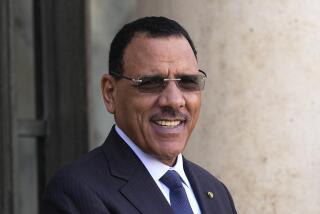U.S. Keeps Mum on Pakistan Crisis : Diplomacy: Bhutto’s ouster is technically legal, so there’s little the White House can do, officials say.
- Share via
WASHINGTON — A frustrated and distracted U.S. government kept quietly on the sidelines Monday in the face of a crisis of democracy in troubled Pakistan, one of America’s staunchest allies in the Third World.
Although a once-vaunted experiment in democracy appeared badly shattered there, neither White House Press Secretary Marlin Fitzwater nor State Department spokeswoman Margaret Tutwiler brought up the subject at their daily briefings. Nor did any reporter ask about Pakistan at the hectic sessions, dominated by the Iraq-Kuwait and Liberian crises.
But, even if they had been asked, Fitzwater and Tutwiler probably would have had little to say.
“What can we do about Pakistan?” a Bush Administration official asked privately. The decision by the Pakistani president to dissolve the government of Prime Minister Benazir Bhutto was technically permissible under the nation’s constitution, though questionable in the interest of democracy.
Also, American officials had a difficult time bemoaning the blows to democracy in Pakistan since they have long disparaged Bhutto’s ability to govern. Just a few months ago, in fact, a U.S. official insisted that the greatest political threat to Bhutto came from Bhutto herself.
Bhutto has failed to solve the gnawing problems of the impoverished country, and the nation has suffered corruption, a rash of kidnapings and a sharp increase in other violent crime. Bhutto’s support of Muslim separatists in Kashmir also led to a tense confrontation with India.
“Our basic feeling,” a State Department official said Monday, “is that a constitutional change of government is an internal matter for the people of Pakistan. Our support for democracy for Pakistan has been repeated many times.”
Asked about the prospects for future democracy and stability, the official replied only: “We are watching it closely.”
Yet there seemed little doubt that democracy had suffered in the crisis.
“I would describe it as a quasi-coup,” said Peter Galbraith, an Asia expert in Washington who attended both Harvard and Oxford universities with Bhutto, 37. “Under the constitutional process in Pakistan, the president should have permitted a vote of confidence. That would have been the legitimate, constitutional way to do it.
“I’ve just been in touch with Benazir by phone,” Galbraith went on. “She is afraid that the new elections will not take place on Oct. 24 as promised. Her house is surrounded by military troops. Her papers have been seized. . . .”
Bhutto’s father, Zulfikar Ali Bhutto, was deposed as prime minister by a military coup in 1977 and executed by hanging two years later.
Galbraith said that, although Benazir Bhutto is not frightened, “she is very concerned about the situation. But she has been through so much that I wouldn’t say she was worried about her safety.”
The tepid official U.S. reaction to the Pakistan crisis was surprising in view of the long history of closeness between the two countries. During the Cold War, the United States counted heavily on Pakistan as its main anti-Communist ally in South Asia, and Pakistan served as the main instrument of American policy in supporting Afghan rebels against the Soviet-backed government in Kabul. Pakistan, in fact, now receives more military aid from the United States than any other country except Israel and Egypt.
More to Read
Get the L.A. Times Politics newsletter
Deeply reported insights into legislation, politics and policy from Sacramento, Washington and beyond. In your inbox twice per week.
You may occasionally receive promotional content from the Los Angeles Times.










